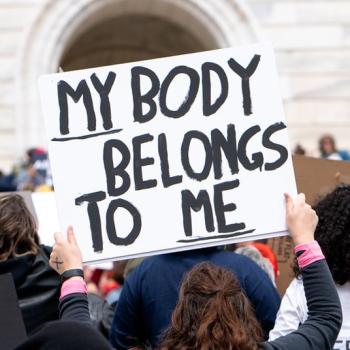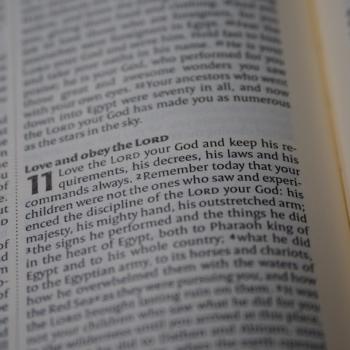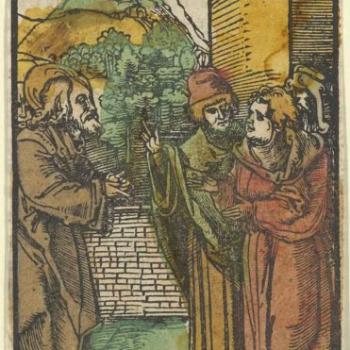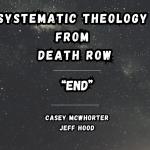We’ve all heard the expression, “Doubting Thomas.” This expression is based is based on the Apostle Thomas’ experience with Jesus in John 20:24-29:
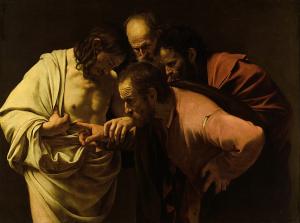
Thomas, the one called Didymus, one of the Twelve, wasn’t with the disciples when Jesus came. The other disciples told him, “We’ve seen the Lord!” But he replied, “Unless I see the nail marks in his hands, put my finger in the wounds left by the nails, and put my hand into his side, I won’t believe.” After eight days his disciples were again in a house and Thomas was with them. Even though the doors were locked, Jesus entered and stood among them. He said, “Peace be with you.” Then He said to Thomas, “Put your finger here. Look at My hands. Put your hand into My side. No more disbelief. Believe!” Thomas responded to Jesus, “My Lord and my God!” Jesus replied, “Do you believe because you see Me? Happy are those who don’t see and yet believe.” (CEB)
By this time, Jesus had appeared to the other disciples. For some reason, Thomas wasn’t there when Jesus appeared. As a result, Jesus refused to believe Jesus was alive. He didn’t just doubt resurrection; he doubted testimony that Christ was alive. Thomas wanted tangible proof that Jesus rose from the dead.
It’s a simple enough story, but have we paused to consider what it means to be a “doubting Thomas?” Moreover…have we considered the ways we display doubt, ourselves?
Dwelling in doubt
We tend to cast judgment on Thomas. It seems unfathomable that someone who walked, talked, and lived with Jesus could doubt His resurrection. Now, down through the ages, Thomas is seen as a screw-up, as one who failed to believe as he should. We look down on him. But the truth of the matter is we do exactly what Thomas did, all the time.
Thomas didn’t just fail to understand the teaching of Jesus. He also failed to accept the testimony of his brothers and sisters. Thomas’ doubt wasn’t just directed toward Jesus, but also toward those who came to give him report. Why? In the words of Henri Poincare, “To doubt everything, or, to believe everything, are two equally convenient solutions; both dispense with the necessity of reflection.”
We like doubt. When faced with situations that call for discernment, it’s easier to doubt everything and everyone. We call this “sound judgment” instead of assessing situations and taking the time to listen to others.
The common bond of disbelief
Many claim to be believers, but many still have one thing in common: disbelief. Like Thomas, they won’t believe it unless they see it. They don’t want to hear anything that might cause them to reach out or extend help, because they need proof. As long as one remains in a place of “I’ll believe it when it’s here,” nothing is expected of them.
Pay careful attention to Jesus’ words: “Blessed are they who have not seen, and yet believe.” “Seeing yet believing” does not just come from nothing – it often comes from testimony. The Bible came into existence through testimony. Most of us are believers today because of someone else’s testimony. We believe in the possibilities of faith because someone lived their faith through testimony. It’s impossible to “see and yet believe” without testimony.
Yet when it comes to the testimonies that might stand in front of us, we retreat as doubting Thomases. We doubt, we judge, and we find reasons to reject their testimony.
Hurting our witness
Failing to accept the testimony of others hurts our witness. If we expect people to believe our testimony, why do we doubt theirs? Still, have you ever considered how awful it feels to give a report and have others disbelieve it? Some of the most difficult things in life come with the chronic stigma of others’ disbelief:
- We doubt the testimony of rape victims; many say they “asked for it.”
- We doubt the testimony of homeless people; many say they didn’t “try” hard enough.
- We doubt the testimony of people who are called to ministry; many say they are “crazy.”
- We doubt the testimony of those who have mystical or revelatory encounters with God; many say that’ “can’t happen today.”
- We doubt the testimony of people who come and tell us they are different; many say they are still “the same.”
- We doubt the testimony of people who say they have been healed; many say there is some other explanation.
- We doubt the testimony of spouses or partners abused by their spouse or partner; many say they did something to “provoke” them.
- We doubt the testimony of people who come and tell us that they are unhappy, facing temptations, or other things; many casually tell them to “brush” it off, like it doesn’t matter.
- We doubt the testimony of people who are mistreated on their job; many assume in favor of the boss over the worker.
- We doubt when someone has seen or experienced something and we haven’t experienced it or we weren’t there; many openly criticize such possibilities.
We doubt, we doubt, we doubt. We are doubting Thomas.
The facts
We will never impact the world if we allow our doubts to overshadow testimony. If we want to change people’s lives, we need to stop disbelieving them. Instead, let’s pray for a gift of discernment. This will help us know what is true from what is false. This way, we can be a resource. Faith begins with trust. Have we ever considered that people might waiver because we do not extend to them what we expect them to extend themselves.
Put the doubt away, doubting Thomas. Let’s learn to listen and gain greater insight into the spiritual gifts God gives us. Maybe then we will live our faith in a radical way, without doubt.








